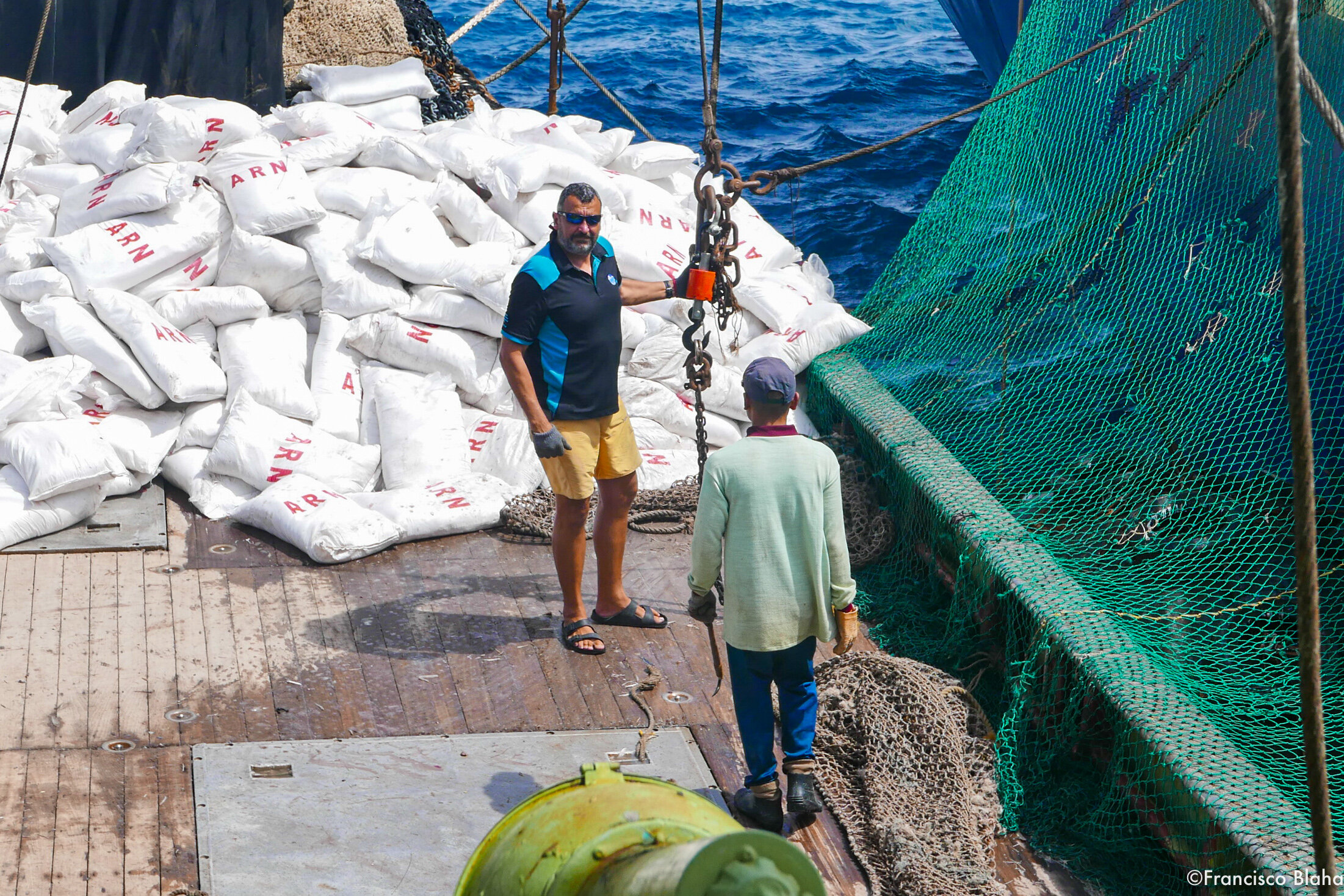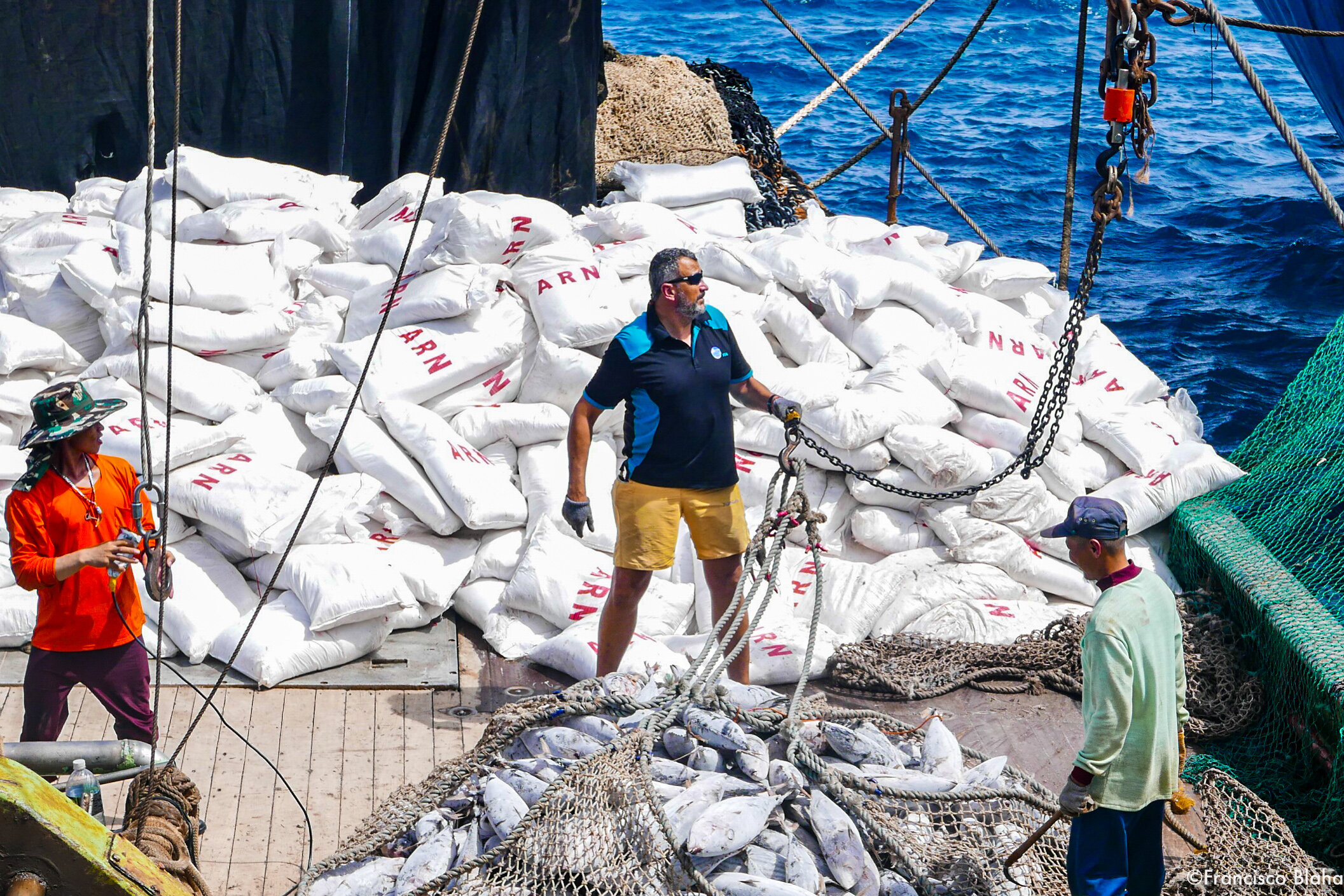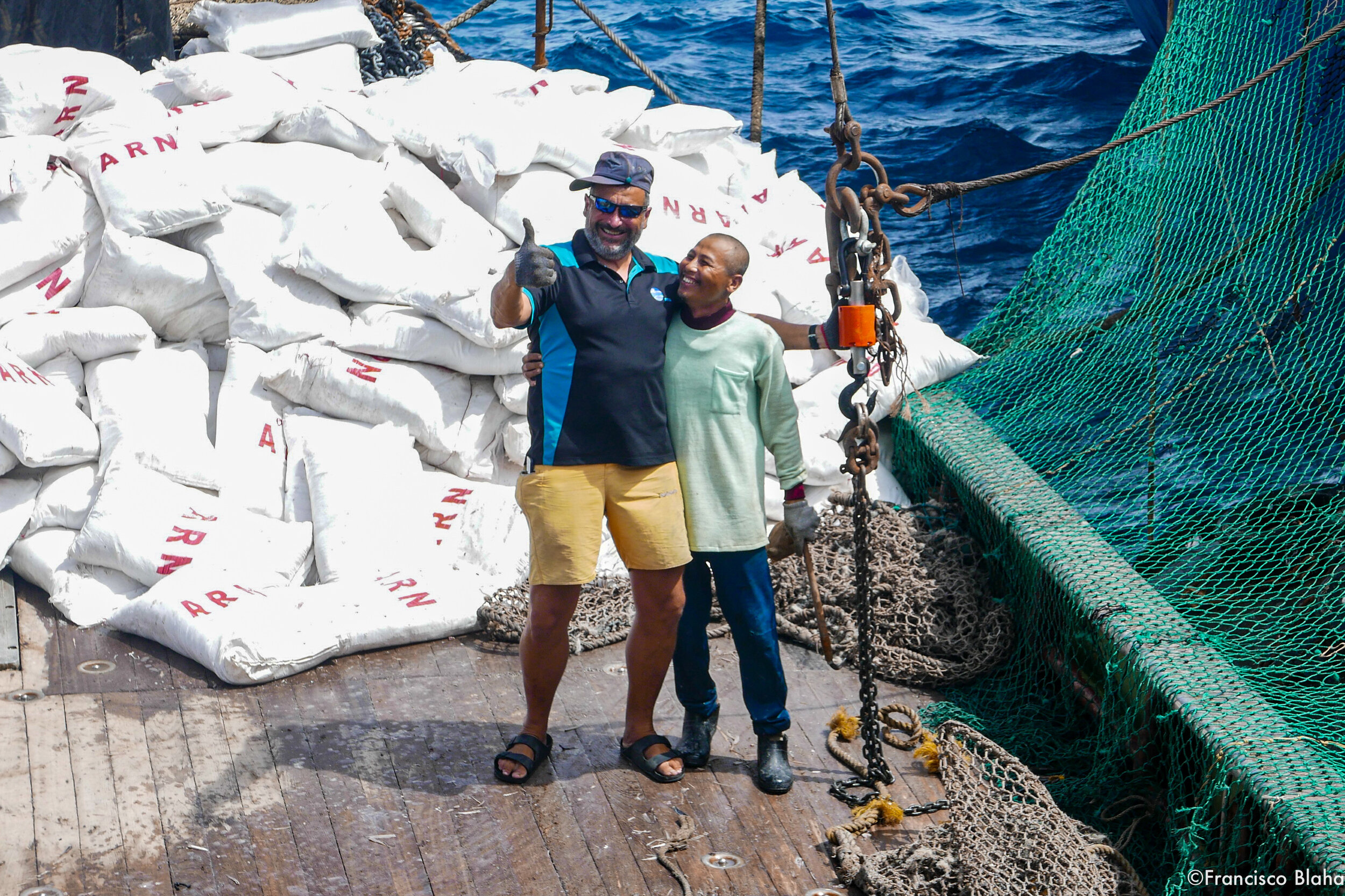It was a weird day… while I’m jumping in btween Purse Seiners here in Majuro, testing crane scales to find one that adapts the best to the job of giving us a much better handle of the volumes of fish transhipped in port in the pacific (results in a future blog). Back in Vigo, the FAO COFI Sub-Committee on Fish Trade (COFI:FT) has its meeting and they discussed the work I was involved with earlier this year on social responsibility.
It was weird because here I’m with Salim, the guy you see in the picture avove… I have 2 weeks more of work here before I go to my loved ones… he has two years more in his contract (out of 3 without going home). People like him who would be the ultimate beneficiaries and the main interested part of what was being discussed in COFI, yet he would never be there… in fact, most people there, never worked on fishing boats,they go home on the weekends, has a salary, etc… that detachment is totally unfair in my opinion.
They discussed this document, that outlines the process, development and proposed future work of FAO in the development of a Guidance framework on social responsibility in fisheries and aquaculture value chains, in accordance with the FAO’s mandate given by the COFI Sub-Committee on Fish Trade (COFI:FT) in 2017 and the recommendation by Members on future guidance on social issues during COFI in 2018.
The guidance (as most things with FAO) is voluntary in nature.
is global in scope. All fisheries and aquaculture value chains are considered, covering upstream and downstream activities involving fish and fish products, including pre-harvest, harvest, and post-harvest.
is primarily addressed to any business actor to ensure socially responsible fish and fish products, regardless of its stage along the value chain, its size (self-employed, small, medium and large), its nature (private or public), and its nationality (domestic, foreign or multinational).
should be implemented by focusing on any actor working in any capacity in fisheries and aquaculture value chains through the promotion of a human rights-based approach.
can be particularly useful for governments in creating a positive environment and promoting socially responsible value chains, as well as for unions, civil society organizations, non- governmental organizations, associations, research and academic institutions, international organizations and all others concerned with the fisheries and aquaculture sectors.
But most importantly it consolidates internationally recognized principles to ensure social responsibility in fisheries and aquaculture value chains, it does not bring new ones (and we were very careful about that)
The objectives of this Guidance are:
to improve social responsibility in fisheries and aquaculture value chains;
to promote human and labour rights, including decent work;
to facilitate compliance by presenting a compilation of relevant international principles;
to serve as a practical instrument of reference to assist actors in establishing or in improving any framework required for the exercise of socially responsible fisheries and aquaculture value chains;
to support the formulation and implementation of appropriate measures;
to enhance transparency along the fish value chains, which can improve traceability initiatives;
to strength interlinkages and exchange of information among the actors, particularly through collaboration and cooperation;
to contribute to a more socially sustainable sector generating economic and environmental benefits to all;
to assist actors in the achievement of the Sustainable Development Goals (SDGs) of the 2030 Agenda for Sustainable Development.
General Principles
This Guidance is based on international human rights anchored in the International Bill of Human Rights of the Universal Declaration of Human Rights and instruments and standards of the International Labour Organization (ILO).
This Guidance is based on the following general principles:
Sovereignty of countries in complying with all relevant laws and regulations;
Clearly and widely publicizing policies, laws, decisions and procedures in applicable languages and formats accessible and applicable to all, equally enforced and independently adjudicated (“rule of law”);
Non-discrimination under law and policies, as in practice;
Equality and equity based on a balanced and fair participation of all actors or interested parties;
Differentiated responsibilities of actors in the fisheries and aquaculture value chain;
Clear accountability of each actor throughout the value chain;
Transparency, particularly in connection with preventing any form of corruption and fraudulent practices;
Practicality, viability and clarity of measures or actions implemented by actors;
Not creating unnecessary obstacles or barriers to trade.
The following specific principles shall be observed to secure compliance with social responsibility based on this Guidance:
Human rights and dignity: Recognition of the inherent dignity and the equal and inalienable human rights of all individuals.
Labour rights: Recognition and respect of the core international labour standards setting out the fundamental principles and rights at work (i.e. freedom of association and effective recognition of the right to collective bargaining; elimination of all forms of forced or compulsory labour; effective abolition of child labour; and elimination of discrimination in respect of employment and occupation) and applicable international labour standards to ensure decent work in fisheries and aquaculture along value chains.
Equity and justice: Recognition and promotion of fair treatment, equity and equitable rights for all, in particular for gender, age, ethnic origin, disability, sexual orientation, and for vulnerable communities and small-scale fishers, taking into consideration the national context.
Non-discrimination: No actor should be subject to discrimination under law and policies, as well as in practice, including the elimination of discrimination in respect of employment or occupation.
Respect of cultures: Recognition and respect of any traditional form of organization, local knowledge and associated practices, including traditional communities, small-scale fishers, indigenous peoples, ethnic minorities, and religion or beliefs.
Health and safety: Adoption of appropriate practices to protect the health, welfare and safety of actors in the activities along the value chains, including the prevention of threats and hazards.
Transparency: Clearly defined roles and activities of all actors throughout the value chain.
Consultation and participation: An active, free, effective, meaningful and informative participation of actors and groups of actors throughout the value chain in decision-making processes, including social dialogues. The engagement and support of actors affected by those decisions, including facilitating feedback and responding to their contributions.
Gender equity and equality: Women and men shall fully equally enjoy all human rights in any sort of context while acknowledging differences between them. Specific measures shall be implemented in order to accelerate de facto gender equality, by empowering women, including leadership assignment.
Recognition of small-scale fishers: Having regard of their singularities, small-scale fishers shall enjoy all human rights in any sort of context, and in particular decent working conditions; access to information; labour, health and social protection.
Distinctive aspects of child labour: Children shall enjoy the same human rights accorded to all people, but they also have distinct rights to protection according to their age. Every child has the opportunity to develop physically and mentally to his/her full potential at different ages and stages of development, including access to education. The work of any child (1) below the required national minimum age of work; (2) that poses work concerns when the child is too young, or (3) considered altogether unsuitable because of its detrimental nature or conditions, shall be abolished.
Fair integration of migrant workers: Having regard their vulnerability, migrant workers shall enjoy all human rights in any sort of context, and in particular decent working conditions, access to information, labour protection and the necessary assistance and support from either their home or host country.
The general and specific principles are interdependent, interrelated and interconnected, and shall be taken into consideration as a whole into a holistic approach.
Relationship with Other International Instruments
This Guidance shall be used, interpreted and applied in conformity with the relevant rules of international law, including the obligations of States under international agreements to which they are a party.
Nothing in this Guidance prejudices the rights, jurisdiction, and duties of States under international law.
This Guidance is complementary to, and supports national, regional, and international initiatives that address human rights and sustainable development.
Cooperation towards a Socially Responsible Fish Value Chain
A socially responsible fisheries and aquaculture value chain is achieved when the private sector, governments, civil society, the United Nations system and other actors cooperate between them, all together, towards an effective implementation of human rights.
The scale and ambition of the results associated with this Guidance are based on working in a spirit of solidarity, in particular solidarity with vulnerable actors and communities, small-scale fishers, indigenous peoples and ethnic minorities.
Specific Activities of the Fisheries and Aquaculture Value Chains
This Guidance also comprises a set of Appendixes elaborating on general and specific principles, taking into consideration the specificities of the fisheries and aquaculture value chains.
These Appendixes provide complementary and specific measures and tools to facilitate compliance and to ensure social responsibility.
Gender equity and equality, distinctive aspects of child labour and fair integration of migrant workers shall be explicitly present in each Appendix.
The Appendixes to this Guidance constitute an integral part of this Guidance.
For each of the following activities, a separate appendix will be developed:
Small-scale fishing
Industrial fishing
Aquaculture production
Processing
Distribution
Retailing
The Appendixes are not mutually exclusive. Therefore, more than one Appendix should be used when there is a combination of activities.
New Appendixes addressing additional activities in the fisheries and aquaculture value chains can be added after being submitted to the FAO Sub-Committee on Fish Trade (COFI:FT).
——
And while all this is in principle basic stuff that should be there already, surely it will be argued against by many… which saddens me…
In my case, my interest is not only professional but personal… you see the guy in the picture above, he can’t be at COFI to push for the FAO guidelines on social responsibility in seafood value chains. I was him once many years ago. I want for him what I had... a good job that could help me go forward in life, yet he will never have that opportunity. Is not fair
And maybe, my taking part is totally unrofessional… but I can’t help my self… Fishing has been my life for the last 37 years
For the record : Salim has a contract, gets paid regulaly, is well feed, can disembark anytime if he feel like, no violence on board, overall he is happy to have a job. We could argue exploitation (as in other industries) but not slavery at sea. My message: be thankful for your blessings!
This is me on deck... my happy place, with some of the most grateful and unpretentious people you’ll ever meet.



